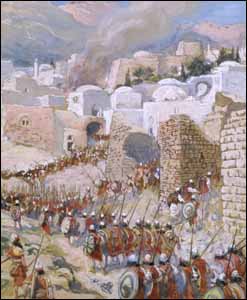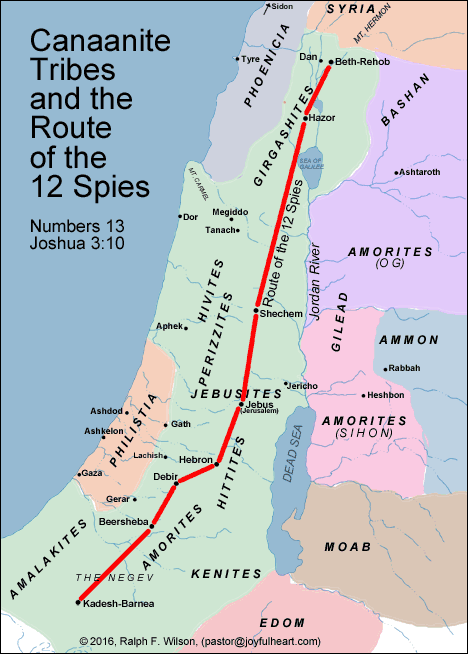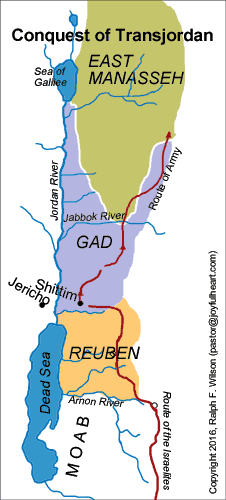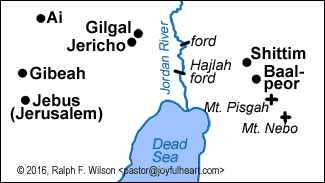
|
Old Testament
New Testament
Gospels
Acts
Paul's Letters
General Letters
Revelation
Topical Studies
Beginning the Journey (for new Christians). en Español

|
Old Testament
New Testament
Gospels
Acts
Paul's Letters
General Letters
Revelation
Topical Studies

|
Home
Bible Studies
Articles
Books
Podcasts
Search
Menu
Donate
About Us
Contact Us
FAQ
Sitemap
 James J. Tissot, 'The Taking of Jericho' (1896-1902), gouache on board, 7-1/4 in. x 5-5/16 in., The Jewish Museum, New York. |
As we begin our study of Joshua, we need to remind ourselves of two things -- the age we're studying and the events immediately preceding.
Bronze Age Values
First, we're in the Late Bronze Age and a kind of primitive society. They're not affluent, rather, they must trust God to survive, and as they enter a region inhabited by other peoples, they must be willing to fight to take the Promised Land. We in the West take peace for granted. Only a small percentage of our populations have ever been in the army. That's for someone else. But in the Bronze Age, if you aren't willing to fight, then your family probably won't survive, especially if you're an immigrant, a newcomer in the land.
Bronze Age values are different from modern values. So instead of judging them from the distance of the twenty-first century, try to judge them based on their history, their culture, and their values.
Forty Years in the Wilderness
Second, we need to understand their immediate history. It has been forty years since Moses led the people of Israel out of Egypt -- longer than any of them had ever imagined it would be. Parents who had left Egypt have all died now -- except Joshua and Caleb. Only their children remain.
The children remember some things, however. In only two years, they had seen Israel cross the Red Sea and Pharaoh's army destroyed. They had drunk water out of the rock, been sustained with manna, and received the Ten Commandments at Mount Sinai. For those two years, their parents had grumbled and rebelled, complained and cursed until they came to the southern boundary of the Promised Land.[3]
When they camped in Kadesh-Barnea -- a desert oasis at the very south of Canaan -- Moses had selected twelve men, one from each of the Twelve Tribes. Two of these men we know from the Book of Joshua -- Joshua and Caleb. The Twelve Spies were to provide reconnaissance of the land, probe for weaknesses, evaluate enemy positions, and develop strategies for conquest (Numbers 13-14). In the map Canaanite Tribes and the Path of the 12 Spies (below) you can trace their route, and the approximate locations of the various peoples in the land -- "the Canaanites, the Hittites, the Hivites, the Perizzites, the Girgashites, the Amorites, and the Jebusites" (3:10). For more on the ethnic groups, see Appendix 2. The Peoples of Canaan.
On their return journey, the Twelve Spies carried a huge cluster of grapes on a pole between two of them as a sign of the fruitfulness of the land. "We went into the land ... and it does flow with milk and honey!" they reported. But ten of them were fearful:
"The people who live there are powerful and the cities are fortified and very large.... We can't attack those people; they are stronger than we are. The land we explored devours those living in it. All the people we saw there are of great size.... We seemed like grasshoppers in our own eyes, and we look the same to them" (Numbers 13:28, 31-33)
These ten spread a bad report among the people, and their fear was infectious. Their view is countered, however, by two of the spies, Caleb and Joshua. Caleb boldly declares:
"We should go up and take possession of the land, for we can certainly do it.... Do not be afraid of the people of the land, because we will swallow them up. Their protection is gone, but the Lord is with us. Do not be afraid of them" (Numbers 13:30; 14:9).
But the people are afraid. The negativism and fear of the majority report have spread through all Israel.
"That night all the people of the community raised their voices and wept aloud. All the Israelites grumbled against Moses and Aaron.... 'We should choose a leader and go back to Egypt.'" (Numbers 14:1-2, 4)

Canaanite Tribes and the Route of the 12 Spies.
Larger map
The people begin to talk of stoning their leaders. At that point, God intervenes. Though he forgives the people their sins of unbelief and contempt against him (Numbers 14:11), he swears that none of that generation would ever enter the land, only Caleb and Joshua. .
"Your children will be shepherds here for forty years, suffering for your unfaithfulness, until the last of your bodies lies in the desert." (Numbers 14:33)
The book of Joshua begins at the close of those forty years of wandering in the Wilderness of Zin around Kadesh-Barnea. The generation of the parents has now all died. Moses, too, passes on at the ripe old age of 120. With his final strength, he climbs Mount Pisgah and surveys the Promised Land. Then he dies, and Joshua is filled with his Spirit (Deuteronomy 34:9).
Moses has brought the people to -- literally -- the very edge of the Jordan. It is Joshua's task to bring them across Jordan and lead them to conquer and occupy the very land Joshua had spied out as a young man 38 years previously. By this time Joshua is perhaps 70 or 80 (we don't know for sure) and along with Caleb, one of the two oldest men of the entire nation. Their contemporaries have all died. Only their children remain.
Joshua is now the leader and feels the whole weight of responsibility upon him. But Joshua's leadership doesn't begin here.
Joshua's Resume
Who is the only person besides Adam and Eve to have no earthly parents? Why, Joshua, of course. He is constantly referred to as Joshua, son of Nun. (It's a joke, people!)
Joshua is a member of one of the largest tribes of Israel, the tribe of Ephraim, and quickly rises to prominence. His name originally is, "Hoshea" ("salvation") but Moses renames him "Joshua," which means, "Yahweh saves" (Numbers 13:16).
Joshua is doubtless already a leader in his tribe when God leads the people out of Egypt. When the Amalekites attack the Israelites at Rephidim, before the people reach Mt. Sinai, Moses calls on Joshua to be the military field commander to organize an army to repel them.
"The Amalekites came and attacked the Israelites at Rephidim. Moses said to Joshua, 'Choose some of our men and go out to fight the Amalekites. Tomorrow I will stand on top of the hill with the staff of God in my hands.'
"So Joshua fought the Amalekites as Moses had ordered, and Moses, Aaron and Hur went to the top of the hill. As long as Moses held up his hands, the Israelites were winning, but whenever he lowered his hands, the Amalekites were winning. When Moses' hands grew tired, they took a stone and put it under him and he sat on it. Aaron and Hur held his hands up -- one on one side, one on the other -- so that his hands remained steady till sunset. So Joshua overcame the Amalekite army with the sword." (Exodus 17:8-13).
After that we see Joshua as Moses' aide or "servant."[4] He accompanies Moses up the mountain to receive the Ten Commandments (Exodus 24:13). When Moses talks to God in the Tent of Meeting, Joshua is there, too.
"The LORD would speak to Moses face to face, as a man speaks with his friend. Then Moses would return to the camp, but his young aide Joshua son of Nun did not leave the tent." (Exodus 33:11)
We catch a little of Joshua's youthful zeal when God's Spirit falls on a couple of Israel's elders in the camp.
"A young man ran and told Moses, 'Eldad and Medad are prophesying in the camp.' Joshua son of Nun, who had been Moses' aide since youth, spoke up and said, 'Moses, my lord, stop them!' But Moses replied, 'Are you jealous for my sake? I wish that all the LORD'S people were prophets and that the LORD would put his Spirit on them!'" (Numbers 11:26-29)
When representatives of the Twelve Tribes are selected to spy out the land, Joshua is chosen for the tribe of Ephraim and Caleb for the tribe of Judah. Though ten of the spies give a bad report, Joshua and Caleb display their faith by encouraging the people to enter the land by faith in God's promises (Numbers 14:8-9).
Finally, it comes time for Moses to choose a successor.
"So the LORD said to Moses, 'Take Joshua son of Nun, a man in whom is the Spirit, and lay your hand on him. Have him stand before Eleazar the priest and the entire assembly and commission him in their presence. Give him some of your authority so the whole Israelite community will obey him. He is to stand before Eleazar the priest, who will obtain decisions for him by inquiring of the Urim before the LORD. At his command he and the entire community of the Israelites will go out, and at his command they will come in.'
Moses did as the LORD commanded him. He took Joshua and had him stand before Eleazar the priest and the whole assembly. Then he laid his hands on him and commissioned him, as the LORD instructed through Moses." (Numbers 27:18-23)
Notice that the Spirit is already upon Joshua (Numbers 27:18). But the commission and authority to command are now conferred by Moses.
Camped at Shittim
 Conquest of Transjordan. Larger map |
Prior to the book of Joshua, Israelite troops have conquered the Transjordan, that is, the lands east of the Jordan River, outlined in Deuteronomy 2:24-3:11. At that time, three of the tribes asked for the land east of the Jordan for their tribal lands: Reuben, Gad, and the half-tribe of Manasseh. However, Moses had charged the leaders of these tribes that when it came time to conquer the land to the west of the Jordan, the fighting men of these tribes had to join the main army until the campaign was complete (Deuteronomy 3:12-20).
As we open the book of Joshua, the people of Israel are camped on the plains of Moab (Deuteronomy 34:8) at Shittim (which means "Acacia Trees," Joshua 2:1), where they have been for months, about seven miles east of the Jordan. This is the last camping place before the Israelites cross Jordan. At Shittim::
- The Israelites commit immorality with Moabite and Midianite women (Numbers 25:1-9) at the instigation of Balaam.
- Israel is numbered in a census (Numbers 26:1-4).
- Joshua is invested with Moses' authority (Numbers 27:18-23).
- Moses recites the history of the people and the laws of God (most of which are contained in the book of Deuteronomy).
- Moses climbs to the top of Mt. Pisgah to see (but not enter) the Promised Land, and then dies at the age of 120 (Deuteronomy 34:1-4).
- Moses is buried nearby in Moab (Deuteronomy 34:5-8).
 Jericho, Gilgal, Shittim, and the Fords of the Jordan. Larger map. |
We've looked at Joshua's life prior to the Book of Joshua; now we turn to our text.
So long as Moses is alive, Joshua can serve under this great leader, awaiting his time. But as we open the book of Joshua, Moses is dead, and Joshua is the sole leader. The weight of the entire enterprise rests on his shoulders..
Have you ever felt fear? Have you ever been overcome with the magnitude of what you have to do and wonder how you can ever do it? That's what Joshua is feeling. But God's words of command and encouragement help him deal with his fear. God says to Joshua::
"Moses my servant is dead. Now then, you and all these people, get ready to cross the Jordan River into the land I am about to give to them -- to the Israelites." (1:2)
Wherever You Set Your Foot (1:3-4)
I've always been fascinated by God's promise in the third verse.
"I will give you every place where you set your foot, as I promised Moses." (1:3)
God recalls to Joshua's mind the general promise that Moses had announced to the whole people:
"Every place where you set your foot will be yours: Your territory will extend from the desert to Lebanon, and from the Euphrates River to the western sea." (Deuteronomy 11:24)
What does this mean? It means that where Joshua and the people actually, physically go, God will give it to them. We see the promise fulfilled in Joshua where the people win battle after battle in campaigns in both the south and north of Canaan. Where they actually go, God gives them the land. But where they don't go, where they don't persist until they obtain the victory, the Canaanites continue to hide out and harass them.
Caleb also remembers this promise when he gets ready to attack the fortified city of Hebron at the age of 85:
"So on that day Moses swore to me, 'The land on which your feet have walked will be your inheritance and that of your children forever, because you have followed the Lord my God wholeheartedly.'" (14:9, citing Deuteronomy 1:36)
This principle also applies in other realms of our life. We want everything brought to us on a silver platter, but God tells us to go and claim it personally. Then God will give it to us. Spiritually, we want to grow. How will we do that? Passively? No. We grow by believing the promises of God and pressing in to see their fulfillment in our own lives. He will give it to us, but we need to find a way to follow him there. The writer of Hebrews exhorts us:
"We do not want you to become lazy, but to imitate those who through faith and patience inherit what has been promised." (Hebrews 6:12)
God outlines the physical territory that he is giving to Israel -- a huge land:
"From the desert to Lebanon, and from the great river, the Euphrates -- all the Hittite country -- to the Great Sea on the west." (1:4)
In fact, during Joshua's time they never set their foot on all this. Most of the lands were under Israel's control by the time of David and Solomon, but then it was lost again through disobedience and unbelief.
There are great tracts of "land" God would give you that are presently occupied by the enemy. They don't belong to the enemy. They belong to you. God has given them to you. There is a saying in legal circles: "Possession is nine-tenths of the law." The enemy has "squatter's rights," but only that. When you -- with God's help -- push the enemy off your inheritance, you can possess it, and experience its blessings. The book of Joshua can be a book of conquest for you spiritually if you let it be.
One feature of the JesusWalk Bible Study Series is discussion questions that draw attention to important points in the lesson. You'll learn best if you pause and take time to write out an answer to the question. If you lead a class or small group, these questions are designed to stimulate discussion and learning. If you study online, you can post your answers on the Joyful Heart Forum by clicking on the web address following the question. You can also learn from how others have answered. Just make sure that your postings are given in love. You can disagree with others, but must show restraint and love. Denomination bashing is prohibited! Okay, now attempt to write an answer to the question.
Q1. (Joshua 1:3) In what way is God's promise to Joshua,
"I will give you every place where you set your foot," a conditional promise?
What's wrong with a faith that consists primarily of the philosophy: "If God
wants me to have it he will give it to me"? What areas that God has promised you
that you must press forward to receive?
https://www.joyfulheart.com/forums/topic/1643-q1-active-faith/
God never leaves, never forsakes us (1:5b)
I suppose, of all the promises in the Bible, this is one of the most precious:
"I will never leave you nor forsake you." (1:5b)
We find it elsewhere in the Bible, too, in Deuteronomy 31:6, Hebrews 13:5, and Matthew 28:20.
None of us deserves God's presence. All of us have sinned and fall short of the glory of God (Romans 3:23). But God has put our sins on Jesus on the cross and punished them there. He has filled us with his Spirit and now abides with us. What a miracle! What grace!
We sin but God doesn't leave us. He disciplines us, but doesn't leave us. Praise the Lord!
This promise, "I will never leave you nor forsake you," is a promise about God's help, but also a promise about his discipline. Here, God meant it to encourage Joshua on the day that his leadership began in earnest.
Q2. (Joshua 1:5b) Why is God's promise to be always with
Joshua so important to him? Why is this promise so important to you in your
present situation? If God is with you, what limitations do you have?
https://www.joyfulheart.com/forums/topic/1644-q2-gods-promise/
Be strong and very courageous (1:6)
What is faith? Very simply, it is believing that God will do what he says he will do. Faith the key principle that underlies the book of Joshua, and the whole of the Christian life. Paul puts it this way:
"Yet [Abraham] did not waver through unbelief regarding the promise of God, but was strengthened in his faith and gave glory to God, being fully persuaded that God had power to do what he had promised. This is why 'it was credited to him as righteousness.'" (Romans 4:20-22)
God gives Joshua a promise: "As I was with Moses, so I will be with you; I will never leave you nor forsake you." Then immediately he gives him a command:
"Be strong and courageous, because you will lead these people to inherit the land I swore to their forefathers to give them." (1:5-6)
Is faith believing the promise? Yes, but that is not trivial. Faith is believing the promise enough that we are strong and courageous when problems come, and the obstacles appear -- and they always do!
Faith requires courage and strength because, only when we exercise courage and strength, do we maintain our belief in any real way. If at the first problem we cave in and give up, we don't have faith, we have unbelief.
We all struggle with this. None of us is immune. Joshua is filled with God's Spirit, has worked alongside Moses, and has been on the mountain with God. But Joshua still needs this kind of encouragement and exhortation.
My friend, one of the reasons you haven't grown more in your walk with God is because of your fear -- fear of people, fear that people won't approve, fear that you'll fail, fear that you'll make a fool out of yourself, fear that you aren't strong enough, fear that God will let you down. Fear.
This promise and command have your name on it: "I will never leave you or forsake you, (insert your name). Therefore, be strong and very courageous!"
Q3. (Joshua 1:6-8) What kinds of things might Joshua be
tempted to fear if he were to allow himself to dwell on his anxieties? What does
it mean to "be strong and very courageous"? What is the distinction between
weakness and strength in Joshua's situation? What is the relationship between
fear and faith? Can you be courageous and still be fearful?
https://www.joyfulheart.com/forums/topic/1645-q3-fear-vs-courage/
Meditate on the Word (1:7-9)
Thankfully, God doesn't leave us to fend for ourselves as we try to take courage. He helps us. His instruction is:
"Be careful to obey all the law.... Do not turn from it to the right or to the left." (1:7)
"Do not let this Book of the Law depart out of your mouth." (1:8a)
"Meditate it on day and night, so that you may be careful to do everything written in it." (1:8b)
This is what will strengthen our faith and courage: attention to God's word. The Psalmist writes:
"Oh, how I love your law!
I meditate on it all day long.
Your commands make me wiser than my enemies....
Your word is a lamp to my feet
and a light for my path." (Psalm 119:97, 105)
The Word of God is not just "sweeter than honey" to us (Psalm 119:103), it is also instructive. We learn wisdom from God as we meditate on His word.
What does it mean to meditate? Do we assume a lotus position and hum? Do we erase all thoughts from our mind and try to merge our thoughts with the Great Beyond? No. That approach, though popular, isn't Christian. It comes from Eastern religion. To meditate means to think about, mull over, ponder. This very Bible study you're engaged in involves you in the process of meditation. You have the text and a list of questions: What? Why? Where? Who? And so you read and think and try to understand. That is meditation.
Someone said that studying the Scripture was like "thinking God's thoughts after him."[5] I like that. When we read the Word of God, we are doing that, retracing in our minds what God is thinking. The more we meditate on God's Word, the more we begin to understand God and the way he thinks. And the more we leave the mindset of our secular world-view, we are "transformed by the renewing of our mind" (Romans 12:2). With this renewal of the mind comes faith, a confidence in God. In a classic statement of the role of scripture in this, Paul writes,
"Faith comes from hearing the message, and the message is heard through the word of Christ." (Romans 10:17)
So God's encouragement and exhortation to Joshua that day met his needs:
- Faith Assurance: "I will never leave you or forsake you" (1:5)
- Faith Exhortation: "Be strong and very courageous" (1:6,9)
- Faith Food: "Meditate on it day and night" (1:8)
Q4. (Joshua 1:8) What does it mean to meditate on the
Word? What is the difference between Christian meditation and Eastern
meditation? How does God work through his Word to renew our minds?
https://www.joyfulheart.com/forums/topic/1646-q4-meditate/
God's success formula (1:8b)
The instructions in verse 8 are keys to prosperity and success: "then you will be prosperous and successful" (1:8b).
In bookstores, you find shelves full of books on "success." You can buy recordings designed to reprogram your mind to think successful thoughts. Much of what they say is true -- but it is not complete. The world says ....
- Trust in yourself.
- Boldly strive for your dream.
- Think good thoughts, positive thoughts.
- Then you will be prosperous and successful.
God says ...
- Trust in me. I will never leave you.... (1:5).
- Be strong and very courageous and step out to possess the land, because I will be with you (1:9).
- Meditate on God's word (1:8a).
- Then you will be prosperous and successful (1:8b).
Be aware of the differences. Faith in self will ultimately disappoint us. The Bible tells us not to do that.
"Trust in the LORD with all your heart
and lean not on your own understanding;
in all your ways acknowledge him,
and he will make your paths straight." (Proverbs 3:5-6)
The world says: be bold, strive for your dream, take risks. And these things are important. But our motivation to be bold must be faith in God's promises. While positive thinking is essential to faith, it is not faith itself. It only opens the way to faith-thoughts within us.
"Finally, brothers, whatever is true, whatever is noble, whatever is right, whatever is pure, whatever is lovely, whatever is admirable -- if anything is excellent or praiseworthy -- think about such things." (Philippians 4:8)
Positive thinking is a partial truth, not a full truth. The full truth is that we should meditate on God's word, not just motivational hype. Jesus said,
"If you hold to (Greek meno, "continue in, abide in") my teaching, you are really my disciples. Then you will know the truth, and the truth will set you free." (John 8:31-32)
The world tempts us with the promise of prosperity and success without God. But the fact is, that whatever measure of prosperity and success we find without God will profit us nothing in the long run. Jesus tells us:
"Man shall not live by bread alone, but by every word that proceeds out of the mouth of God." (Matthew 4:4, quoting Deuteronomy 8:3)
"You cannot serve God and Money." (Matthew 6:24)
"What good will it be for a man if he gains the whole world, yet forfeits his soul? Or what can a man give in exchange for his soul?" (Matthew 16:26)
Moses cautions the people of Israel with God's admonition:
"You may say to yourself, 'My power and the strength of my hands have produced this wealth for me.' But remember the LORD your God, for it is he who gives you the ability to produce wealth, and so confirms his covenant, which he swore to your forefathers, as it is today." (Deuteronomy 8:17-18)
I've spent time on this to help you discern the difference between the world's definition of success and God's. True success is found in God only, not in a success formula divorced from God.
The Order to Advance (1:10-11)
Joshua has been encouraged by God. Now he begins to obey the command he has been given: to lead the people into the Promised Land. It is a small step he takes, ordering the officers to spread the word that they will break camp in three days. But he takes that first small step. That's all he needs to do today: take today's step. As he takes God's step day by day, God will lead him, and Joshua, in turn, will lead the people.
Notice, however, that this first step is generously flooded with faith. Joshua tells the people:
"Get your supplies ready. Three days from now you will cross the Jordan here and go in and take possession of the land that the LORD your God is giving you for your own." (1:11)
He declares his faith to those who are with him on the journey, and so strengthens them, too. Whom can you encourage today, as you take the next small step in your journey of faith?
Joined by the Trans-Jordan Tribes (1:12-18)
This lesson ends with Joshua's admonition to the three tribes that had already settled on the east side of Jordan, to fight with the other tribes to conquer the lands to the west of Jordan -- which they agree to do.
Lessons for Disciples

Lessons in book formats are available. |
In these verses we find several lessons that challenge us as disciples that we would be wise to internalize.
- God wants us to develop a "pressing forward" faith that actively seeks God's will, in keeping with "I will give you every place where you set your foot" (1:3)
- God has promised to be with us in every circumstance -- even when we're afraid -- "I will never leave you nor forsake you" (1:5)
- God wants us to "be strong and very courageous" (1:6-8) in spite of our trepidations and fears.
- Meditating on God's Word helps us grow as disciples in faith and courage (1:7-8).
Prayer
Father, we sometimes have experiences that throw us into a panic that overwhelms us. Help us to be strong and courageous. Inspire us to spend time meditating on your Word. Renew our minds, we pray. In Jesus' name. Amen.
Key Verses
"No one will be able to stand up against you all the days of your life. As I was with Moses, so I will be with you; I will never leave you nor forsake you." (Joshua 1:5, NIV)
"Do not let this Book of the Law depart from your mouth; meditate on it day and night, so that you may be careful to do everything written in it. Then you will be prosperous and successful." (Joshua 1:8, NIV)
Endnotes
[3] For more on the exodus experience, see my book Moses the Reluctant Leader (JesusWalk, 2011).
[4] "Aide" (NIV), "assistant" (NRSV, ESV), "servant" (KJV) is Hebrew shārat, "minister, serve," of the personal service rendered to an important personage, usually a ruler (TWOT #2472).
[5] The phrase, "thinking God's thoughts after him," is attributed to Sir Isaac Newton.
Copyright © 2026, Ralph F. Wilson. <pastor![]() joyfulheart.com> All rights reserved. A single copy of this article is free. Do not put this on a website. See legal, copyright, and reprint information.
joyfulheart.com> All rights reserved. A single copy of this article is free. Do not put this on a website. See legal, copyright, and reprint information.


 To be notified about future articles, stories, and Bible studies, why don't you subscribe to our free newsletter, The Joyful Heart, by placing your e-mail address in the box below. We respect your
To be notified about future articles, stories, and Bible studies, why don't you subscribe to our free newsletter, The Joyful Heart, by placing your e-mail address in the box below. We respect your